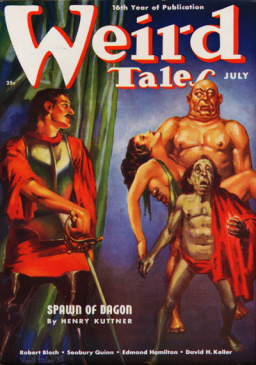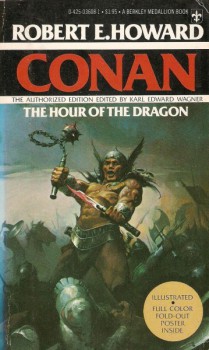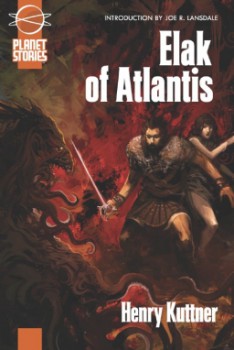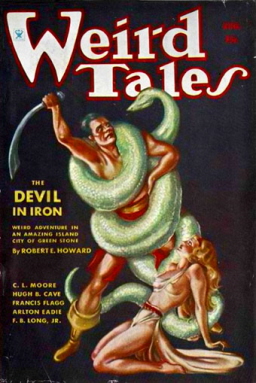Fantasy Face-Off: Henry Kuttner’s Elak of Atlantis vs. Robert E Howard’s Conan the Cimmerian

Now, before I start actually looking at these two heroes, I should probably explain why I’m doing what I’m doing.
You see, when Robert E Howard — creator of the sword and sorcery sub-genre, bare-fisted boxer, and all-round amazing writer — killed himself at the age of thirty, he left a pretty substantial gap in the pulp fiction market, one that was very hard to fill, but one that had to be filled. So Henry Kuttner, a fellow writer more famous for his science fiction than his fantasy, was called in to take up the sword and sorcery mantle — and stumbled in doing so.
The blurb describes the Elak stories as “exciting tales that helped establish a genre,” and “a major step in the evolution of the genre.” (I read Gateways kindle collection.)
Yeah that’s… an overstatement, not much more than a writer’s hyperbole. To be frank, the Elak tales are most easily comparable to a Saturday morning cartoon or a SyFy B-movie, what with all the hackneyed prose and clichéd characters.
Kuttner makes no attempt to advance the formula that Howard established, no attempt to evolve the genre as the over-enthusiastic blurb suggests. What you get instead is a readable adventure, entertaining, but not much more; it’s plot and prose, its action and characters merging with all the other yarns you’ve read and books you’ve consumed.
But then perhaps that’s the point. Pulp is meant to entertain; it’s not The Lord of the Rings or The Game of Thrones, it’s not supposed to make you think or take sides, not intended to evolve anything. Just to entertain.
[Click on any of the images in this article for larger versions.]
 But then, look at Conan; the character and his world have inspired three films, a whole range of comic books, board games, video games, action figures and countless pastiche novels, he’s an icon of fantasy, of pop culture.
But then, look at Conan; the character and his world have inspired three films, a whole range of comic books, board games, video games, action figures and countless pastiche novels, he’s an icon of fantasy, of pop culture.
He doesn’t need an introduction, you say Conan and people instantly conjure up an image of ol’ Arnie in a loin cloth. Ask someone more knowledgeable and they’ll picture the supple tiger Howard envisioned, or the lurid Frazetta paintings of yesteryear.
And he was only designed for entertainment, so there must be something special about Howard’s work to warrant all this.
Thankfully, there is.
I don’t have to tell you that Robert E. Howard is a masterful writer, that his prose, his pacing, his driving narratives are beyond almost every other author you already know.
But I feel Howard’s success in making Conan an icon comes from the way the warrior is presented. The goal here is clear, coherent and excellently achieved: The barbarian is an indomitable force of destruction, a fighting machine who stands head and shoulders above everyone else.
It’s so much clearer, so much more effective than Kuttner’s delirious and tentative approach, where the hero fades away, pales into nothing more than a run-of the mill protagonist, in a run-of-the-mill story.
We are told he’s a powerful, indomitable, indefatigable force, but then shown something entirely different as the man is knocked unconscious time and time again, or lies cowering before some lurid new foe, begging a priest and his god for help. It’s annoying, infuriating almost, seeing the hero crumble when all you want is a macho-man fight fest.
 Then there’s the way the worlds are presented.
Then there’s the way the worlds are presented.
Howard’s Hyboria was the original gritty fantasy world, caked in the blood of its races and creatures, ravaged by war, and basking in corruption. It’s excellent, fully formed and serving as a fitting, albeit basic world for Conan’s adventures, all handed to us by the flawless poetic, powerful prose that Howard is so famous for.
Then turn to Atlantis, the world of Elak, and again Kuttner is betrayed by whoever wrote the blurb. We’re told it’s a “brutal world of flashing swords and primal magic,” but it’s not.
It’s nowhere near that. It’s just the generic, quasi-medieval landscape that features in every other fantasy, every other book, every other story; it’s just some disembodied, rather tedious mimic of Howard’s creation.
So not that different from a pastiche, really. It lacks the charm of Middle Earth or the personality of Hyboria, it lacks a character of its own, and that’s what holds Elak of Atlantis back.
OK, so maybe I’m selling Elak a little short. The stories do have some redeeming qualities; their occasional touches of humor provide a decent counterpoint to those moments when Conan grows painfully po-faced.
The camaraderie between Elak and Lycon can also be found in Fritz Leiber’s Fafhrd and the Grey Mouser series, and Elak himself is a more fallible protagonist then Conan, which makes some of his encounters more tense, and thus more effective.
 But most of these are only half-formed concepts or rare highlights. The stories have no definable strengths or weaknesses, the humor is so cliché it has no impact, the friendship between Elak and Lycon feels forced and Kuttner manages to eliminate all tension with a rather boring, kind of lazy ‘here comes the cavalry’ resolution with most battles.
But most of these are only half-formed concepts or rare highlights. The stories have no definable strengths or weaknesses, the humor is so cliché it has no impact, the friendship between Elak and Lycon feels forced and Kuttner manages to eliminate all tension with a rather boring, kind of lazy ‘here comes the cavalry’ resolution with most battles.
It all feels a little forced, and I know too well what Kuttner is trying to do and how he’s trying to do it. These stories they can only be described as mundane, average.
And average is worse than terrible because you don’t remember it, it’s not unique, it’s the same as everything else out there. Average can be summed up with a ‘meh.’
If Kuttner had found a focus, he may have been able to emulate the success of Howard. If he had chosen to let his imagination run wild, given Elak crazed and insane behemoths to battle, something unlike any other creature anywhere else, or, much like the ‘Keegor’ stories, layer on the clichés and tropes knowingly, creating something deliriously imaginative but semi-satirical.
This, whilst it may not have been what the folks at Weird Tales wanted, may have been something successful and unique in its own right, as opposed to the mundane mimic that we got with Elak.
So Kuttner was Brooks to Howard’s Tolkien? If so, I’d argue that yes, he did help establish the “genre” in terms of consciously (I assume) trying to write stories that took elements from the Conan stories and turned them into tropes that other, later writers would just kind of adopt as the standard, in much the same way that it was really Sword of Shannara (rather than LotR itself) that birthed the “fat epic fantasy trilogy” genre for better or for worse.
I do like the Elak stories well enough; I think the Raynor stories might be better. Neither of them hold a candle to Howard, obviously, but they’ll do in a pinch.
I’ve read this post twice and I’m still trying to understand what it’s about. What was the author trying to do? Everyone knows that no one does s&s better then REH. I don’t recall ever hearing anyone say that Elak was a better Conan then Conan. This article reads as if written by a fan-boy bully trying to prove how tough he is by picking on a littler kid.
John, Black Gate is better then this.
I like the
Brooks-Howard analogy a lot. There is a sort of laziness to many of the proceedings but at least he never stretched it out to novel length like Brooks. Still, I like the Elak stories and they are a clear roadmark on the path to swords & sorcery as a full fledged genre and not just the work of REH.
I’m going to object to the way the comparison between Howard and Kuttner is made in this post.
Howard’s first professionally published story was “Spear and Fang”, which appeared in Weird Tales in 1925. He had been writing for a few years before that. Howard created Conan in 1932, eight years after he first started selling to professional markets.
Comparing Kuttner’s publication history, his first published story was “The Graveyard Rats” in 1936, also in Weird Tales. “Thunder in the Dawn”, the first of the Elak stories, was published only 2 years later, in 1938, as were the second and third Elak stories.
In other words, the author of this essay is comparing an experienced professional writer working at the top of his game (Howard) with a relative newcomer who is still learning his craft (Kuttner). This is unfair and misleading to his readers who might not be aware of the differences in experience between the two writers under discussion.
By the time Kuttner had been publishing as long as Howard had, he had moved on from Weird Tales and was writing for one of the highest paying markets of the day, Astounding Science Fiction.
At the risk of being accused of comparing apples to oranges, I would say that the work Kuttner did in this period was as good as anything Howard did in the last four or five years of his life. Yes, Howard never wrote much science fiction, and he and Kuttner had completely different styles. But my point is that Kuttner produced a body of work that is more than capable of standing beside Howard’s. Work that’s very different in tone, style, and subject matter, but just as good as far as the literary merits are concerned. Try “Mimsy Were the Borogoves”, “When the Bough Breaks”, “We Kill People”, “The Proud Robot”, or the Baldy series to see what Kuttner was capable of.
Howard and Kuttner are two of my four favorite writers (the other two being Brackett and Bradbury). Both experimented with different genres and styles; both took chances artistically. Both produced great work and things they would probably prefer to be forgotten. They both produced classics in the field that influenced generations of writers who came after them. But to compare the mature work of one with the journeyman work of the other is poor scholarship and lazy writing.
I agree that the Kuttner-Howard comparison is unfair. Mr. Gormley, if you want to see Henry Kuttner letting his “imagination run wild,” take a look at The Dark World, Earth’s Last Citadel, and The Valley of the Flame, among many others. His accomplishment in fantastic literature was fully as considerable as that of Howard – and just as sadly cut short.
Thanks, truly for the honest and constructive feedback, I’m still relatively new to this so it’s really appreciated.
In retrospect perhaps the comparison was a little unfair and a sold Kuttner rather short. I merely felt the comparison would have been an interesting one, given, as I said, that Kuttner was to fill the gap Howard left in the market.I think everyone knew Howard was going to come out on top, that wasn’t so much the point, merely to see how Kuttner stands up next to him.
Regardless, I apologise for the controversy, Perhaps next time I’ll stick to the reviews!
Thanks again Connor.
Connor, I appreciate your response to our comments. I don’t think you should necessarily stick to reviews, either. Just be a little more careful in how you phrase things. Writing is a learning process, as I was trying to point out, and you (like me) are in the process of learning. And sometimes you learn the most from things that don’t succeed.
Frankly, while I disagree with the way you approached Kuttner’s work, I’m glad you wrote about him. His work deserves a wider audience than it’s traditionally gotten.
No one is going to say that the Elak stories rise to the level Conan, nor the two Prince Raynor tales, although the latter are more mature than the Elak stories. I do think when compared directly to Conan, it’s easy to miss the positive things about the Elak and Prince Raynor. (See these posts and the links to the others on the sidebar: http://adventuresfantastic.blogspot.com/2010/12/kuttners-elak-of-atlantis-dragon-moon.html http://adventuresfantastic.blogspot.com/2011/04/henry-kuttners-prince-raynor-cursed-be.html)
I think the comparison is a reasonable one. I’m not sure Kuttner’s inexperience is really the issue – I tend to think of him as a sci-fi author, so maybe S&S wasn’t really his thing. Sometimes you need to read less successful, contemporary attempts at a particular genre to appreciate a more familiar, successful author in his proper context. Or at least, that’s been my experience – try reading the Sexton Blake books, then go back and re-read Sherlock Holmes.
The comparison was an interesting one, regardless of where Kuttner was as a writer at the time they asked him to try and fill the void left by the mighty REH.
I’m not familiar with Kuttner’s work so now I’ll keep an eye out for his sci-fi, which is lauded here in a couple of the comments.
As for filling the void behind REH, who really could have done that? Karl Edward Wagner. Maybe Moorcock.
As a fan of both Kuttner and Howard I would agree with the assessment of Elak but not so much Kuttner, who as pointed out by other posters comes into his own later. Elak was exactly what the pulps wanted: a kind of pastiche, which would ultimately pale compared to the source material because a pastiche celebrates the wrong things.
Yes, Howard was about headlong action, and about colorful prose, with burly masculine characters who didn’t take crap from anybody. But what sets Howard apart from those who pastiched him is that he believed in the decay of civilization _and bemoaned it_. His sadness that “barbarism is the natural state of mankind” was often as profound as his contempt for decadent civilization; there is correspondence where he openly says he does not find the “barbarian life” attractive. But the vital vigor of it was too much for the civilized world. For Howard the decay of stable, settled civilization and the power of wild, energized barbarism was in constant tension.
If to the writer Conan was all about physically running roughshod over obstacles, upsetting the apple cart of civilized people, taking their stuff, and overwhelming their women then that’s what your pastiche is going to be and it will fail, as history has borne out.
But when the writer actually gets Howard, as john a karr mentions Karl Edward Wagner, then you have something that makes its mark and has a literary legacy.
I agree with Joe H. in the Elak/Conan to Shannara/Middle-Earth comparison. Superb Joe! I also agree with the others that when Kuttner finds that focus Connor mentions he is one of the greats to be followed.
Crom, in all my blathering I forgot my last point: good post Connor, keep it coming.
[…] the luminaries covered by Bud Webster’s Past Masters, but before that Connor Gormley wrote a Fantasy Face-Off featuring Henry Kuttner’s Elak of Atlantis vs. Robert E Howard’s Conan the Cimmerian, I […]
[…] is immersion, this is an impressive achievement. I touched upon this not too long ago with my Fantasy Face-off article; noting prose dictates the way we see the world on the page, and, therefore how vivid and […]